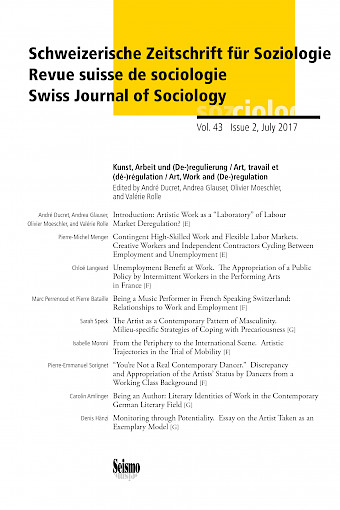Cahier 43/2.2017
Art, travail et (dé-)régulation
Schweizerische Zeitschrift für Soziologie
Wenn die Künste im Fokus der Aufmerksamkeit stehen, dann häufig als “Laboratorium” unterschiedlicher Formen der Deregulierung von Arbeit, da sie sich den Normierungen der Lohnarbeit im Industriekapitalismus, die zunehmend durch die Hegemonie des Finanzmarktkapitalismus in Frage gestellt werden, schon immer weitestgehend entziehen konnten. Die in diesem Themenheft versammelten Beiträge aus der Schweiz, Frankreich und Deutschland beleuchten – gestützt auf unterschiedliche analytische Instrumente – verschiedene Kunstwelten (Theater, Musik, Tanzes, Literatur, bildende Kunst) und loten diese in Zusammenschau mit der (De-)regulierung von Arbeit in anderen gesellschaftlichen Bereichen aus.
C’est souvent comme « laboratoire » des formes de dérégulation du travail que les arts retiennent l’attention. Non que les artistes possèdent une longueur d’avance sur les transformations du monde du travail depuis les années 1980, mais bien parce qu’ils ont, pour beaucoup, échappé à la norme du salariat moderne propre au capitalisme industriel, désormais fragilisé par l’hégémonie du capitalisme financier. Issues de terrains d’enquête en Suisse, en France et en Allemagne, les contributions de ce volume mobilisent des outils d’analyse variés pour éclairer différents mondes des arts (théâtre, musique, danse, littérature, arts visuels), mis en parallèle avec d’autres sphères d’emploi et de travail.
The arts can often command attention as a “laboratory” for the different forms of labour deregulation. It is not that artists have been ahead of the transformations of the labour market since the 1980s, but rather that they have, for the most part, escaped the standard of the modern wage system specific to industrial capitalism, now weakened by the hegemony of financial capitalism. The contributions to this volume, stemming from field inquiries in Switzerland, France and Germany, draw on various analytical tools in order to shed light on different artistic disciplines (theatre, music, dance, literature, visual arts), drawing parallels with other fields of employment and labour.

